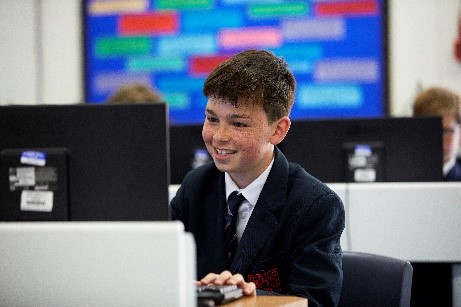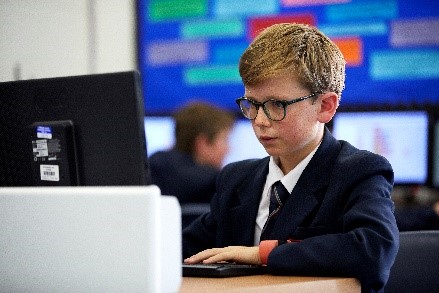Computer Science
Head of Department – Mr R. I. Green
Overview
In Computer Science, our intent is to empower our students by developing their computational thinking skills.
Computational thinking can be described as the skills which help you think like a computer scientist. It is a set of transferable problem-solving skills that can be applied to any area of life. They underpin everything we do in the subject.
At TBGS, our computer science course is designed to be relevant to modern world. A world in which computer systems are all around us, affecting virtually everything we do. In this world, having a knowledge and appreciation of technology, is becoming more and more essential. The course gives students an in-depth understanding of computer technology and a look at what goes on under the covers. It equips them for the modern world.
By learning computational thinking, students are also equipping themselves with very real transferable problem-solving skills; furthermore, by studying computer programming students develop their abilities in critical thinking, analysis and logic.
Programmes of study
When students enter the school in year 7, they have a wide range of experiences in Computer Science. We aim to build on this to allow every student to reach their full potential in the subject.
Keystage 3
Intent
During key stage 3, the curriculum provides a wide range of experience of the subject to allow all students to expand their skills, gaining experience of ICT as part of the process. We teach students how to program the computer using a variety of platforms, while learning some of the key principles on which computers function, such as binary data representation.
In programming, we want to progressively develop each student’s skill while developing an understating of the fundamental building blocks of programming. To this end, we teach block-based coding during year 7, introducing text-based programming with Python in year 8, before tackling VB.Net in year 9. The work in year 9, allows students to get a flavour of this programming environment, which we use at key stage 4 and beyond.
We also run the Bebras and Matrix challenges during lessons, to encourage students to apply their learning to a range of problems , while eSafety topics are taught in each year to help students develop into safety conscious and empowered users of the technology.
Implementation
In years 7 to 9, students complete a single one-hour lesson each week covering the following topics:
Year 7
- Robotics (using VexCode.VR)
- Data representation including binary, character, image and sound representation, compression and encryption of data
- Bebras challenge
- Matrix challenge
- eSafety
- Principles of programming: algorithms, sequence, selection and iteration
- Programming in Scratch
- Hardware (input, output and storage devices, the CPU)
- Programming with BBC MicoBits
Year 8
- eSafety
- Spreadsheet skills
- Bebras challenge
- Matrix challenge
- Programming in Python
- Programming principle: strings, control flow, functions, lists and dictionaries
- Cyber security – encryption, decryption, substitution and transposition ciphers
- Android app development using App Lab
Year 9
- eSafety
- Data representation including binary and hexadecimal conversations
- Logic gates
- Programming in VB.Net
- Bebras challenge
- Matrix challenge
- Key algorithms: searching and sorting
- Databases
- Building webpages using HTML + CSS
Impact
Students complete an assessment at the end of each unit to assess their understanding of material covered in that unit. These results are used to identify attainment and to monitor progress.
In the summer term, an end-of-year examination is completed. This is a summative assessment, which covers all topics that students have studied during this academic year.
Keystage 4
Exam board: AQA, course code 8525
During key stage 4 (years 10 and 11), GCSE Computer Science is available as an option subject.
Intent
At key stage 4, the curriculum is designed to allow students to develop their knowledge and skills in computer science, while preparing them to complete their GCSE examination at the end of year 11.
We start in year 10, building on the VB.Net programming skills students gained during their year-9 course, extending and enhancing these, encouraging students to work in an increasingly independent manner.
Our objective is that by the time students have started Year 11, they will be able to independently write code to address a range of programming problems, which will be presented in the form of a small project. By the end of this year, they will be experienced in writing software and will have the thorough knowledge of the subject required to achieve their goals in the final examinations.
Implementation
Topics covered include:
- Fundamentals of algorithms
- Programming
- Fundamentals of data representation
- Computer systems
- Fundamentals of computer networks
- Fundamentals of cyber security
- Relational databases and structured query language (SQL)
- Ethical, legal and environmental impacts of digital technology on wider society, including issues of privacy
- Practical programming (VB.Net)
Detailed information on the course content can be found in specification here https://www.aqa.org.uk/subjects/computer-science-and-it/gcse/computer-science-8525
We provide all necessary resources for students through Microsoft Teams, SharePoint and the OneNote class notebook feature in Teams. This provides a very detailed and comprehensive set of resources that cover the whole syllabus in detail, and can be easily accessed remotely.
If students wish to supplement this information with a textbook of their own, AQA have a number of approved texts which are described here:
https://www.aqa.org.uk/resources/computer-science-and-it/gcse/computer-science/teach/textbooks
Impact
During years 10 and 11, students complete a number of tests in lessons to monitor their progress and learning.
In the final examination series at the end of year 11, they take two written examinations, each 2 hours and worth 50% of the qualification.
Paper 1
What is assessed?
Computational thinking, code-tracing, problem-solving, programming concepts including the design of efficient algorithms and the designing, writing, testing and refining of code.
How is it assessed?
A mix of multiple-choice, short-answer and longer-answer questions assessing programming, practical problem-solving and computational thinking skills.
Paper 2
What is assessed?
This examination assesses understanding of data representation, computer systems, networking cyber security, relational databases and SQL programming, plus the ethical, legal and environmental impacts of digital technology on wider society, including issues of privacy.
How is it assessed?
A mix of multiple choice longer answer and extended response questions assessing SQL programming skills and theoretical knowledge.
There is no examination-board assessed coursework component to this course; however, students have to complete a number of practical programming projects during the course, allowing them to develop the necessary software development skills.
Keystage 5
Exam board: Eduqas, A Level in Computer Science.
Subject entrance requirements:
- GCSE Computer Science – grade 6
- GCSE Mathematics – grade 7
We will consider students who have not completed the GCSE in Computer Science, who can provide evidence of significant programming experience in a text-based language, comparable with GCSE level 7.
Intent
In this course, we aim to support our students to allow them to follow their chosen pathways after school, regardless of whether that is a Higher Education course, an apprenticeship or employment in the field of Computer Science.
This course develops hardworking, organised and confident students who can develop working solutions to a wide range of problems. It also aids development of other important life skills such as time management, project management and presentation skills.
The examination syllabus has been selected as it provides a good range of content, while remaining very accessible to a large number of students with a broad range of interests.
Course Content
The course is arranged into three components
Component 1 – Programming and System Development
This component investigates programs, data structures, algorithms, logic, programming methodologies and the impact of computer science on society.
Contents:
- 1.2 Logical operations and Boolean simplification
- 1.3 Algorithms and programs
- 1.4 Principles of programming – programming paradigms
- 1.5 Systems analysis
- 1.6 System design
- 1.7 Software engineering
- 1.8 Program construction – translation
- 1.9 Economic, moral, legal, ethical and cultural issues relating to computer science
Component 2 – Computer Architecture, Data, Communications and Applications
This component investigates computer architecture, communication, data representation, organisation and structure of data, programs, algorithms and software applications.
Contents:
- 2.1 Hardware and communication
- 2.2 Data transmission
- 2.3 Data representation and data types
- 2.4 File organisation
- 2.5 Databases and distributed systems
- 2.6 The operating system
- 2.7 Applications software
- 2.8 Data security and integrity processes
Component 3 – Programmed Solution to a Problem
This is the non-examination assessment part of the course, in which candidates discuss, investigate, design, prototype, refine and implement, test and evaluate a computerised solution to a problem chosen by the candidate which must be solved using original code (programming).
This is a substantial piece of work, which we start in January of year 12, and complete by Christmas in year 13.
Full details of the course content are described in the examination board specification, which can be downloaded here https://www.eduqas.co.uk/media/zhpapwjj/eduqas-a-level-computer-science-spec-from-2015-e-24-01-2020.pdf
Assessment
- Component 1 – written examination, 2 hrs 45 mins, 40% of the A-level marks
- Component 1 – written examination, 2 hrs 45 mins, 40% of the A-level marks
- Component 3 – the programming project completed between January in year 12 and Christmas in year 13, 20 % of the A-level marks
Resources
We provide all necessary resources for students using Microsoft Teams, SharePoint and OneNote, providing a detailed and comprehensive set of resources that cover the whole syllabus in great detail.
If students wish to supplement this information with further textbooks of their own, the exam board publish a list of approved texts:
Preparing to study A-level Computer Science
Before starting the course, it would be very useful for students to use ISAAC Computer Science https://isaaccomputerscience.org/ to improve their overall understanding of the subject.
Here they can read, make notes and complete the quizzes on the following GCSE transition topics https://isaaccomputerscience.org/teaching_order
- Programming concepts
- Data representation
- Boolean logic
- Systems
- Networking
Useful background information can also be gleaned from films such as “The Imitation Game (2014)” and “Hackers”.
Setting and Collecting Work – Teams
In Computer Science, we make extensive use of Microsoft Teams, SharePoint and OneNote which are used in every lesson. All resources used during lessons are hosted here and work is set and handed in here.
For each lesson, a bulletin message is posted on the relevant course’s bulletin board, which describes what the students will be doing in the lesson, along with links to all resources used in the lesson.
Any homework is also described here along with the deadline.
This system ensures that all students have access to all the necessary resources whether in school or at home. With Teams being accessible from any device with an internet connection, when students miss lessons due to illness or any other reason, they can immediately see the work that we have been covering during lessons.

Computer Science Resources
We teach in dedicated rooms equipped with dual-monitor PCs running Windows 10, one machine per student.

We use a wide range of modern software including
- Microsoft Office 365 – available at no cost from the school’s SharePoint site. https://tbgstorbaysch.sharepoint.com/SitePages/Classroom.aspx
- Microsoft Visual Studio – used for Visual Basic and C# programming. This is available as a free download at https://visualstudio.microsoft.com/thank-you-downloading-visual-studio/?sku=Community&rel=16 (students should install the .Net development package)
- Scratch – available as a free download from https://scratch.mit.edu/
Lunch Club
We run a twice weekly, lunchtime club for all students, where they can explore the subject further or gain help with any aspect of their Computer Science work. These sessions are run on a drop-in basis, taking place the IT rooms with a specialist computer science teacher supervising these sessions to provide help and support where necessary.
Competitions
To inspire and challenge students, we take part in a range of competitions and challenge events over the course of the year, to allow students to extend their skills and develop their interest in the subject. These include the British Informatics Olympiad and Cyber Discovery programme, along with the Bebras, Matrix and Oxford Computing challenges.
Where Computer Science Can Take You
There is currently a huge shortage of people with the right skills in computing, and organisations around the world are struggling to appoint suitably qualified people. The problem is so severe that the Department for Education made the teaching of computer science a compulsory subject for all state schools in September 2014.
At TBGS, our course puts you years ahead of the rest. It is also an ideal step towards any higher-level degree level courses which rely on problem-solving skills, especially where they are applied to technical problems. These areas include engineering, financial and resource management, science and medicine.
There are many courses to choose from when looking at applying to universities. Some courses focus solely on Computer Science, while others cover a myriad of subjects including Software Engineering, Information Technology, Systems Management Cyber Security, Internet Security, Data Science and Artificial Intelligence etc.





